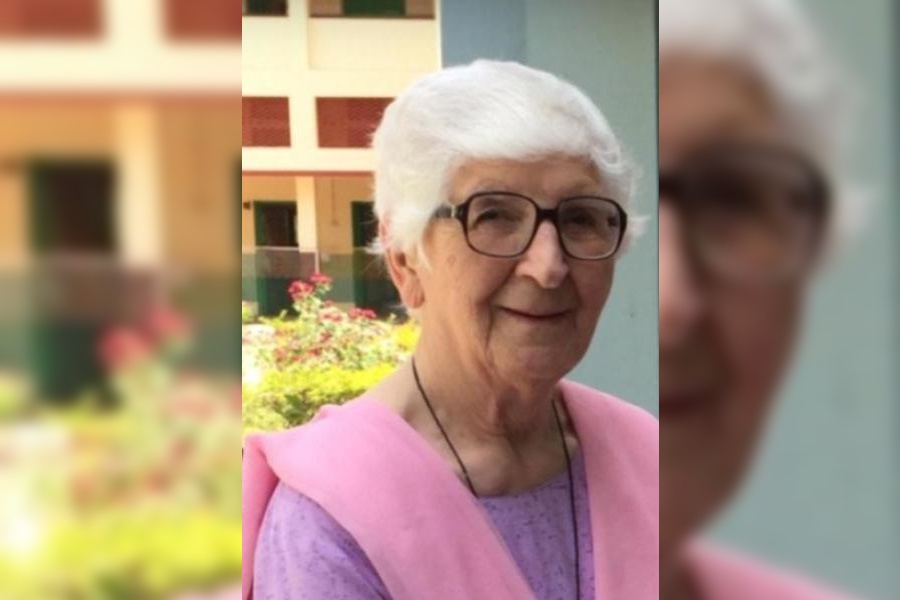Irish nun of the Loreto Order, Sister Maeve Hughes, 96, was a scholar, author and innovative principal of Loreto College Calcutta for over 14 years. She died in the city on Saturday.
She balanced sharp discipline and judgement with compassion and inspired hundreds of young women to understand the value of pursuing postgraduate studies and teaching. A master’s in Bengali, who spoke like a native, the last years of her life were spent in promoting Bengali and teaching Dalit students.
I first met her at the principal’s office. Sitting across the far end of a room lined with epics from the East and West and Milton’s Paradise Lost and a worn collection of the Irish dramatist J. M. Synge’s complete works, was a stern faced nun in a regular Loreto Order habit. When I shook her very white hand, her face broke into a smile.
After schooling at Loreto House I was accepted at Headington School at Oxford, but at 16 , unable to cut myself from my mother’s apron strings. I did a quick turnaround.
“Your mother came to see me yesterday and warned me that Trouble was on the way. So Bijalpita, you are back in the Loreto fold, and I have found you a place very late in the day and though it was tough I found you a spot to join the English department as an undergraduate. I am sure you will prove Headington’s loss is Loreto’s gain.”
Right through college I began to understand that this encouragement from Sr. Maeve was one of her tools she used deftly to nudge both students and teachers to excel in their performance.
Sr. Maeve was tough as nails as I found out working closely with her as the president of the student council, taking her mesmerising classes on Riders to the Sea by J.M. Synge and dialoguing with her on College goals and academic plans.
She was a great fashionista, which few knew about, and taught me all I knew about bolero style blouses and the many kinds of footwear from Ferragamo pumps to Kolhapuri chappals. But she was a great proponent for appropriate behaviour and abhorred students who flouted the rules of correct attire by wearing spaghetti straps and hot pants.
Sucheta Mukherji, one of the finest professors who taught English and who worked closely with her, recalls: “Sr. Maeve was very organised, super efficient, who attended to things almost immediately. She trusted the workers and blasted the shirkers. She patrolled the corridor , and listened in on classes to judge the manner of teaching. Erudite herself, she taught Jadavpur University Comparative Literature and had a master’s in Bengali. She wanted to create an institution of excellence and not a finishing school. She guided and supported senior professors and greenhorns alike.”
I watched her work tirelessly and when I was student council president in 1978, I often found her deep in archival research, writing her books, after a whole day of administrative work and teaching.
Well known for shining the light on the fringes who wanted to write in their own languages like Bengali — like her own Irish brethren who fought the English tongue by signposting the Gaelic language — Maeve Hughes became a serious supervisor for Dalit students who were PhD scholars in Ranchi, where she lived her last decades and where I went with my husband, over the years, to meet her. She was way before her time.
Her book Epic Women: East and West, published by the Asiatic Society (208 pages, hard cover), is a new contribution to Women’s Studies with a special emphasis on India and Ireland.
She attempts to correct the imbalance in the ancient historical literature which is dominated by men and where women are few. Her assessment of a male dominated society in the Mahabharata was the subject that brought us close, and Draupadi and Shakuntala were her heroes.
According to Mamta Swaika, ex-head of the department of geography: “She taught me that teaching was not just a career but a vocation, where you gave more than you got back.’’
Says Anuradha Chatterji, former head of the department of history and vice-president of the Loreto College Alumnae Association: “ Sr. Maeve became the principal of Loreto College in 1974-75, when we were in our third and final year as undergraduates. She was a tough disciplinarian and an acknowledged scholar with published work, and dedicated to academic proficiency. I was fortunate to join the teaching staff at Loreto College during her tenure. Her wisdom, commitment to education and gentle mentoring inspired me over the years as we stayed in touch.”
Jacqueline Lewis PhD, professor at Minnesota State University, remembers Sr. Maeve as a “consummate academic, she demanded high standards from all the students and I am grateful for that. She was a wonderful mentor who encouraged me to get that PhD and become a professor. She manifested the Loreto values and served as a role model for all the students”.
Sadhna Arora Roy Kapur says of all the incidents she remembers clearly with Sr. Maeve, it was the one when a small group of undergrads were walking some steps behind Sr. Maeve in the corridor, and as youth sometimes do, were referring to Sr. Maeve as Oi buri ta: “Oi buri ta kichhu bujhbe na. Akta Irish nun Bangla ki bujhbe?” As the girls were about to walk into the classroom Sr. Maeve turned around and with a smile that stretched from cheek to cheek said “Ei buri ta Bengali te MA korechhe”. The girls nearly jumped out of their skin. That was the manifold Sr. Maeve. She could laugh at herself when needed, and still be a tour de force.
Author is an academic and author










